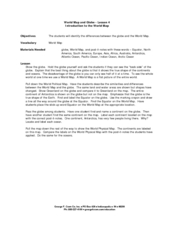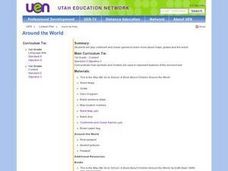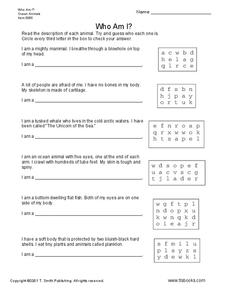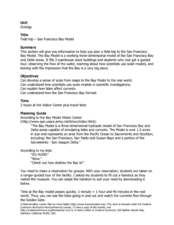Curated OER
Introduction to the World Globe
Students examine a globe and the world map to see what constitutes the differences. In this world map introductory lesson, students discuss what they see when they view the globe. Students then, look at a world map and compare the...
Curated OER
The Magic School Bus Explores the Ocean
Students are introduced to "The Magic School Bus Explores the Ocean". They should have been studying the ocean. They have heard and read many books on the topic. This software will bring the ocean to life and provide information to...
Curated OER
North America, Then and Now
Learners identify ocean, lake, gulf, and continent on maps of North America from 1845 and the present, and identify Pacific and Atlantic Oceans, the Great Lakes, and the Gulf of Mexico on maps of North America from 1845 and the present.
Curated OER
The Ocean Floor -- Science
Young scholars work together to create a model of the ocean floor. They practice using new vocabulary associated with the ocean floor as well. They share their model with the class.
Curated OER
High and Low Tides
Students collect real world data from the Web regarding high and low tides at various locations in the United States. They find a function which models this data and make predictions on tide levels based on the information found.
Curated OER
What's in that Cake?
Students discover the methods scientists use to investigate Oceanic habitats. In this oceanography lesson, students utilize the Internet to identify deep sea submersibles and how they help scientists study the Charleston Bump. Students...
Curated OER
Deep Ocean Currents
Students observe the interactions of different temperatures of water using colored ice and a thermometer and then compare the results with global ocean current solar heating. They identify where floating ice would be found in the ocean,...
Curated OER
New: Around the World
First graders identify and demonstrate how symbols and models are used to represent features of the environment. They use a map and a globe to label where the students in the book came from, point out the continent, and show which ocean...
Curated OER
Who Am I?
In this earth science learning exercise, students read the description of each animal and identify who each one is. They circle every third letter in the box to the right to check their answer.
Curated OER
Where in the Book?
In this language arts worksheet, students identify which page to locate various chapter of a book for specific things about caring for a pet turtle. Then they determine how many chapters there are in the book and give it a title.
Curated OER
Field Trip - San Francisco Bay Model
Students investigate scale models while attending a field trip within the San Francisco Bay Area. In this oceanography lesson plan, students identify the currents of the Bay Area and discuss how they are created by different tides....
Curated OER
Beach Zonation
Students explore biology by participating in an organism identification activity. In this beach field trip lesson, students identify the different areas of the beach in which organisms reside and discuss the differences between high tide...
Curated OER
Clam Hooping
Learners explore ocean biology by capturing organisms on a beach. In this clam collecting lesson plan, students identify the clam species and discuss the anatomy of a clam as well as the importance they provide as a meal. Learners...
Curated OER
Discovering the Deep
Students explore the world's oceans. They research questions about the oceans and write a research report about an ocean animal. Students identify at least four different writing genres they experienced while reading about the ocean.
Curated OER
Continents and Oceans on the Move
Learners create an awareness of the vast percentage of water covering the earth. They relate similarities/differences between topographical maps and other maps of various time periods. Students examine how to use a topographical map.
Curated OER
Navigation Across the Seas
Pupils examine nautical navigation and discover the differences between nautical charts and other types of maps or charts. Students practice setting a course, taking a bearing, and dead reckoning. This gives pupils an example of how...
NOAA
Technology I
Isn't technology great? The 12th installment of a 23-part NOAA Enrichment in Marine sciences and Oceanography (NEMO) program introduces technology that marine scientists use. Pupils take part in an activity using conductivity,...
University of Southern California
What Lives In The Ocean?
One of the most diverse environments on Earth is the ocean. Young scientists explore the living things found in the ocean during an exciting seven-lesson unit. Their study includes organisms from plankton to invertebrates and vertebrates...
NOAA
Plate Tectonics II
Mid-ocean ridges, rift valleys, island arcs, mountain ranges, earthquakes, volcanoes ... there are so many features associated with plate tectonics. The 14th installment of a 23-part NOAA Enrichment in Marine sciences and Oceanography...
NOAA
Vertebrates II
Mammals of the ocean unite! Or not. The 20th installment of a 23-part NOAA Enrichment in Marine sciences and Oceanography (NEMO) program investigates how warm-blooded marine mammals survive in water. In the class activity, learners use...
Curated OER
Branches of Earth Science
Connect earth science to science occupations and real-life events with this worksheet and activity. After listing the 4 branches of earth science, learners spend some time brainstorming two activities each type of earth scientist might...
NOAA
Sediments
Calcareous ooze ... what an interesting name! The 15th installment of a 23-part NOAA Enrichment in Marine sciences and Oceanography (NEMO) program focuses on sediments found on the ocean floor. After viewing the slideshow lecture,...
NOAA
Coastal Dynamics
Life's a beach! The 16th installment of a 23-part NOAA Enrichment in Marine sciences and Oceanography (NEMO) program first examines different types of coasts and how they form. An activity then has learners investigate the shoreline...
Curated OER
I, Robot, Can Do That!
Assign groups of middle school oceanographers to research one of the following underwater robots; ABE, Herculues, ROPOS, RCV-150, Tiburon, or general purpose ROVs. An included handout guides them through information to be gathered. Each...

























